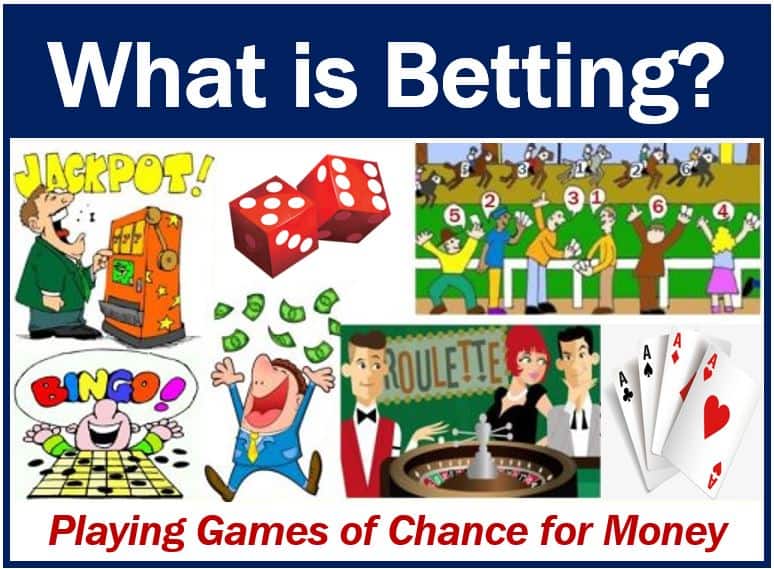Betting is the action of gambling money, possessions, time, or something else on the outcome of something, such as a game or race. In other words, the act or practice of playing games of chance for a stake; usually money. We can also, in most cases, use the word ‘gambling’ with the same meaning.
The verb, to bet, means to gamble. People all over the world have been betting on the outcomes of things for thousands of years. Six-sided dice existed in Mesopotamia about 3000 B.C., i.e., 5000 years ago.
Individuals involved in betting risk losing something, depending on the outcome of, for example, a horse race. However, they also have a chance of winning something. In most cases, if they win, they get back more than their stake.
We can also use the term as a verb when we do not believe somebody. For example, if my friend John says “Last week I spoke to the Queen.” If I don’t believe him, I can answer “I bet!“
The term emerged in the English language, with the meaning ‘the making of wagers,’ in the 1590s.
Betting vs. gambling
Some people say that in betting, the person placing a stake has a better idea of what might happen than in gambling. In other words, gambling relies on pure luck while betting can benefit from research.
For example, if you bet on the horses, you can study the past performances of the horses, jockeys, and trainers. You can also find out what kind of terrain each horse prefers. Some horses, for example, prefer soft terrain. Therefore, if it has been raining, it is more likely to do well.

With gambling, on the other hand, you have no idea what the outcome will be. In a casino, for example, I don’t know what number will come up next on the roulette table.
However, the two words are often used interchangeably. Therefore, although technically their meanings might be different on paper, in real life they are virtually the same.
Types of betting
Betting exists in hundreds of forms. There are table games, non-casino games, arcade games, and electronic gaming.
Bingo, lotteries, and dead pool, for example, are non-casino games – they take place outside casinos.
People commonly bet when playing card games, such as Poker, Baccarat, and Blackjack. Three-Card Brag and Faro are also popular card games for betting on.
The most common forms of betting are:
- Casino-style card games such as Texas Hold’em and BlackJack/21.
- Dice games such as craps.
- Roulette.
- Electronic games, including online slots, keno, and poker.
- Games involving personal skill. Bowling, skeet ball, pool, and some video games, for example, require personal skill.
- Bingo.
- Raffles.
- Pitching quarters or other coins.
- Lottery tickets and scratchers (UK/Ireland: scratch cards).
- Betting on sports such as soccer (UK/Ireland: football), basketball, boxing, etc.
- Horse racing.
- Sporting events.
Tax receipts from betting
In countries where betting is allowed, governments receive significant tax revenues from the gaming or gambling sector.
